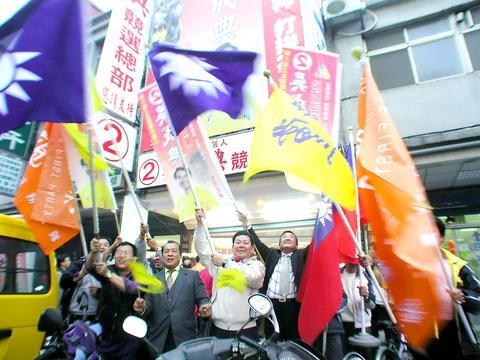The political geography was little changed yesterday as the Democratic Progressive Party (DPP) and its ally, the Taiwan Solidarity Union (TSU), failed to boost their local standings.
Taipei City residents did not enthusiastically take part in the election. Statistics showed only 61 per-cent of voters cast ballots.

PHOTO: WU CHENG-TING, TAIPEI TIMES
In northern Taipei City, or district one, the pan-green camp and the pan-blue camp split the 10 seats down the middle. But the district was the only place the DPP's ballot-allocation strategy worked.
In district two, the pan-blue camp of the Chinese Nationalist Party (KMT), the People First Party (PFP) and New Party, retained their strong influence.
The KMT and the DPP each won three seats, the PFP took two and the TSU won one. Independent Li Ao (
The KMT's Lai Shyh-bao (
In Taipei County, the DPP held onto its 11 seats but its ally didn't fare as well. The TSU lost one of the two seats it had gained in 2001 election. The pan-blue camp added three more seats to the 13 it won in 2001 for a total of 16. KMT candidate Wu Yu-sheng (
Although President Chen Shui-bian (
In Taichung City, the pan-green and the pan-blues evenly split the eight seats being contested.
In Yunlin County, the pan-greens gained some ground, although the election was affected by the arrest of former county commissioner Chang Jung-wei (
The pan-greens added one seat to the two they won in the country in 2001 with the victory of TSU councilwoman Yin Lin-in (
In Chiayi County, the DPP safeguarded its three seats by taking 63 percent of the vote, while a KMT candidate won the other seat.
In Tainan County, home not only to President Chen but fanatic pan-green supporters, the DPP held onto its five seats by taking al-most half the votes. The KMT won two seats and an independent candidate took the remaining seat.
In Tainan City, the pan-green camp lost one of the four seats won in 2001 as the TSU's candidate lost. The KMT won two seats and a PFP candidate won one.
In the two electoral districts of Kaohsiung City, the pan-greens gained about 53 percent of the vote, a significantly improvement over the 48 percent won in 2001.
The DPP's Lee Kun-tse (
But the pan-green's vote-allocation strategy didn't work in the southern dis-trict, where they lost one seat. The greens won seven seats, the KMT took two and the PFP won two.
In Pingtung County, the DPP lost one of its four seats. The KMT won two seats and and an independent candidate took one.
In eastern Taiwan, the pan-blues continued their tradition of strong showings. In Taitung County, KMT Legislator Huang Chien-ting (
In Hualien County, DPP Legislator Lu Po-chi (
In offshore counties, independents and other candidates did well. Penghu County's sole seat was won by Lin Ping-kun (
Four Aboriginal candidates were elected in plains townships. The DPP's Chen Ying (

A preclearance service to facilitate entry for people traveling to select airports in Japan would be available from Thursday next week to Feb. 25 at Taiwan Taoyuan International Airport, Taoyuan International Airport Corp (TIAC) said on Tuesday. The service was first made available to Taiwanese travelers throughout the winter vacation of 2024 and during the Lunar New Year holiday. In addition to flights to the Japanese cities of Hakodate, Asahikawa, Akita, Sendai, Niigata, Okayama, Takamatsu, Kumamoto and Kagoshima, the service would be available to travelers to Kobe and Oita. The service can be accessed by passengers of 15 flight routes operated by

Alain Robert, known as the "French Spider-Man," praised Alex Honnold as exceptionally well-prepared after the US climber completed a free solo ascent of Taipei 101 yesterday. Robert said Honnold's ascent of the 508m-tall skyscraper in just more than one-and-a-half hours without using safety ropes or equipment was a remarkable achievement. "This is my life," he said in an interview conducted in French, adding that he liked the feeling of being "on the edge of danger." The 63-year-old Frenchman climbed Taipei 101 using ropes in December 2004, taking about four hours to reach the top. On a one-to-10 scale of difficulty, Robert said Taipei 101

Taiwanese and US defense groups are collaborating to introduce deployable, semi-autonomous manufacturing systems for drones and components in a boost to the nation’s supply chain resilience. Taiwan’s G-Tech Optroelectronics Corp subsidiary GTOC and the US’ Aerkomm Inc on Friday announced an agreement with fellow US-based Firestorm Lab to adopt the latter’s xCell, a technology featuring 3D printers fitted in 6.1m container units. The systems enable aerial platforms and parts to be produced in high volumes from dispersed nodes capable of rapid redeployment, to minimize the risk of enemy strikes and to meet field requirements, they said. Firestorm chief technology officer Ian Muceus said

MORE FALL: An investigation into one of Xi’s key cronies, part of a broader ‘anti-corruption’ drive, indicates that he might have a deep distrust in the military, an expert said China’s latest military purge underscores systemic risks in its shift from collective leadership to sole rule under Chinese President Xi Jinping (習近平), and could disrupt its chain of command and military capabilities, a national security official said yesterday. If decisionmaking within the Chinese Communist Party has become “irrational” under one-man rule, the Taiwan Strait and the regional situation must be approached with extreme caution, given unforeseen risks, they added. The anonymous official made the remarks as China’s Central Military Commission Vice Chairman Zhang Youxia (張又俠) and Joint Staff Department Chief of Staff Liu Zhenli (劉振立) were reportedly being investigated for suspected “serious